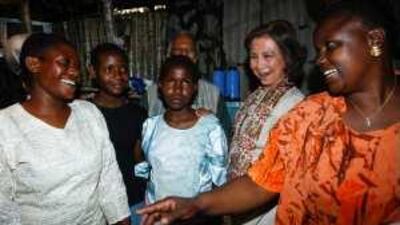NAIROBI // Rose Waithera lives in a small house made out of sheets of corrugated tin. In front of her home, an open sewer carves a fetid path through the rough dirt street. And this is one of the better neighbourhoods in Mathare, a squalid slum known for its hardened criminal gangs. Ms Waithera lived much of her life as a street beggar, but on a recent afternoon she felt like the most important person in the world. Although her neighbours will never believe her, Ms Waithera hosted the queen of Spain, a Nobel Peace laureate and the first female vice president of an African country in her tiny one-room house.
The three luminaries, Queen Sofia of Spain, Muhammad Yunus, who initiated microloans to the poor, and Isatou Njie-Saidy, vice president of Gambia, sat on couches in the dimly lit three square-metre room and listened to Ms Waithera's story. "I was born in the streets," she said. "I had to beg for everything. Then I got my first loan of 3,000 Kenyan shillings [Dh184] and bought some pots and started a business selling githeri [bean and maize stew]. Now I am servicing a loan of 30,000 Kenyan shillings. I am moving into a beautiful house."
The queen sat rapt, nodding her head at the story. Afterward, she said: "Very impressive. I loved the visit. I thought it was very instructive." For two decades, Queen Sofia has been a champion of microcredit loans to the world's poorest people who do not have access to mainstream banks. She works closely with her friend, Mr Yunus, considered the father of microcredit. Mr Yunus, a Bangladeshi economist, posited in the 1970s that poor people could lift themselves out of poverty if they were given loans to start small enterprises. Today, microfinance is considered one of the most sustainable means of development.
The international development community descended upon Nairobi last week for the Africa-Middle East Microcredit Summit, the largest microfinance meeting ever held in took part in the summit. In Kenya, there are hundreds of microfinance institutions offering loans sometimes as small as US$100 (Dh367) or less. Jamii Bora, the largest such institution in Kenya, has 260,000 members and has lent a total of $43 million in 10 years. The company offers a wide range of financial products to the poor including health insurance and has even built an affordable housing project.
The 2,000-home Kaputiei project is the first of its kind in Kenya. It is designed to move people out of squalor and into clean, permanent housing that they will be able to own through micro-mortgage payments of $30 per month. Ingrid Munro, the founder of Jamii Bora, aid: "Our experience is that the most desperate are the ones that need microfinance the most. The poorer they are, the more they need microfinance. And they don't need charity because charity is a way to keep people down."
While microfinance is well established in Asia, with nearly 100 million microloans, it is still in its infancy in Africa. Less than 10 per cent of the world's microloans to the poorest clients are in Africa. Leaders discussed how to increase socially responsible lending businesses in Africa. Sam Daley-Harris, the director of the Microcredit Summit Campaign, said: "There are many 'nexts'. There's the next in microfinance and youth. There's the next in microfinance and green energy. But there's also the next in 'how can I make a profit off the poor?' That's there too, whether we like it or not."
Since the world's poor have traditionally been shut out of the formal banking system, they often turn to informal money lenders or loan sharks, who charge crippling interest rates of 100 per cent or more. Advocates for socially responsible business, such as Mr Yunus, want lenders to exist not for profit, but to lift poor people out of poverty. Interest rates at microfinance institutions are around 10 per cent to 20 per cent. Repayment rates hover around 90 per cent for microloans.
Mr Yunus said the world's financial system can learn a lot from the world of microfinance. During the latest financial crisis, when large banks around the world failed, microfinance institutions thrived. "When banks started to collapse, the whole world was shaking," Mr Yunus said. "But no one noticed that billions of people didn't have access to banks at all. For them, the banks remain closed forever. Microcredit, which doesn't rely on collateral, was flourishing. Now is a good time to ask who is credit worthy. It is a good time to change the financial system to make it more inclusive."
During their visit to the Nairobi slum, Mr Yunus and Queen Sofia heard many stories of people who were lifted out of poverty through microfinance. At one point, the queen stopped to buy handmade jewellery from Samuel Zangi, who started his small business with a loan from Jamii Bora. "I was a drinker and a smoker living on the streets," Mr Zangi told the queen. "But thanks to the loans I have received, I turned my life around."
mbrown@thenational.ae

